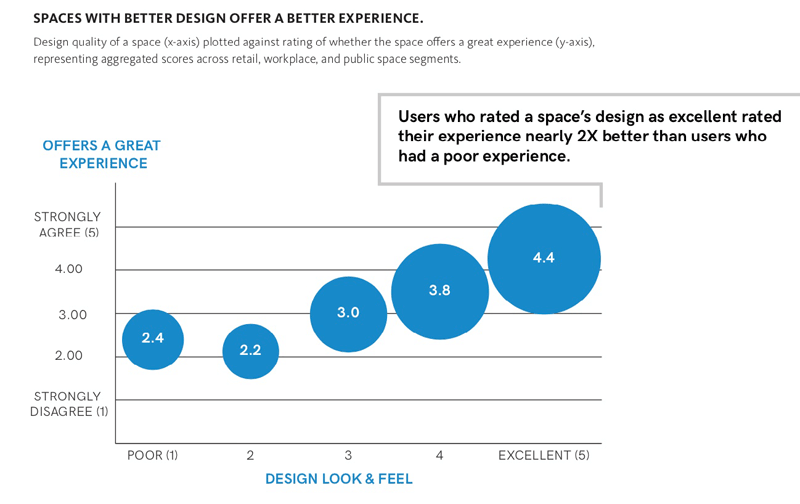
Vol. XVII, No. 8, December 2017
- Editor's corner
- More about the appeal of LTOs
- Unpartnered share of Americans on the increase
- Meet the conscientious consumer
- Ocean5 and Table 47 about to raise the bar
- A shrinking young adult market
- The importance of great designed spaces
- Out-of-home entertainment expenditures on the increase
- It's no longer about entertainment; it's all about the experience
- The marriage of food and entertainment
- Outdoor attractions are solid FEC profit centers
- Wake up at dawn to dance at this new rave
- Households with children on a downward slope
- New CLVs worth noting
The importance of great designed spaces
The Gensler Research Institute, a division of the worldwide Gensler design company, recently conducted research on the impact that design has on peoples' experiences. They conducted a nationwide survey of 4,000 U.S. respondents to examine the wide range of factors and to explore potential relationships that drive a great experience. They found that design of the physical space proves to have a significant, quantifiable impact on the quality of people's experiences. Survey respondents who reported the space they visited to be extremely well designed on average rated their experience nearly twice better than those who said the space was poorly designed.

Their search report stated, “In today's experience economy, we know that creating a good experience isn't enough; the best places - ones that engage people's emotions and keep them coming back - have to be great. They have to exceed a user's expectations. To meet these higher standards for experience, design proves to be a key differentiator between good and great - the specific factors rise to the top. Spaces that are beautiful, unique, inspirational, and welcoming are most likely to engage users and stand out from the crowd.”
The research also examined the impact of technology on experience. It found that the presence of technology is a key driver of a great experience - spaces that users reported to have the latest technology are more highly rated, more likely to be their favorite. However, users appeared to be “less interested in technology that they could interact with or use directly, and more interested in technology that is embedded in the space and contributes to the overall designed experience.” In other words, technology was part of the design. “Technology may be more about impression than direct engagement - people see it as a powerful symbol of innovation.”
The report concluded with “Every place and space today is ultimately competing on the experience it delivers. As a new generation of consumers shifts spending and attention towards experience-based consumption, the need to deliver a differentiated experience has never been stronger. . . Compete on experience, win with design.”
Vol. XVII, No. 8, December 2017
- Editor's corner
- More about the appeal of LTOs
- Unpartnered share of Americans on the increase
- Meet the conscientious consumer
- Ocean5 and Table 47 about to raise the bar
- A shrinking young adult market
- The importance of great designed spaces
- Out-of-home entertainment expenditures on the increase
- It's no longer about entertainment; it's all about the experience
- The marriage of food and entertainment
- Outdoor attractions are solid FEC profit centers
- Wake up at dawn to dance at this new rave
- Households with children on a downward slope
- New CLVs worth noting


